Why Outdoor Play Matters in Early Childhood Education: A Study
VerifiedAdded on 2021/09/29
|14
|3924
|512
Essay
AI Summary
This essay delves into the critical importance of outdoor play within early childhood education, emphasizing its profound impact on children's holistic development. The paper addresses the question: why outdoor play is an important area to consider in relation to early childhood? It highlights the benefits of play-based learning, including cognitive, physical, social, and emotional growth. The essay references research studies on innovative approaches like the 'Forest School' model, which leverages natural environments to enhance children's experiences. It discusses the United Nations Commission for Human Rights' recognition of play as a fundamental right and contrasts the diminishing role of outdoor play with the rise of technology and its potential health implications. The paper also explores the integration of outdoor play within early education curriculums, citing examples from countries like Singapore and Canada, while also acknowledging safety concerns. The essay argues that play helps in improving the basic skills that children must be proficient in, and allows the effective coordination between the response to external stimuli and neuronal functioning. The essay's findings support the inclusion of outdoor play as an integral component of early childhood education, promoting comprehensive child development and well-being.
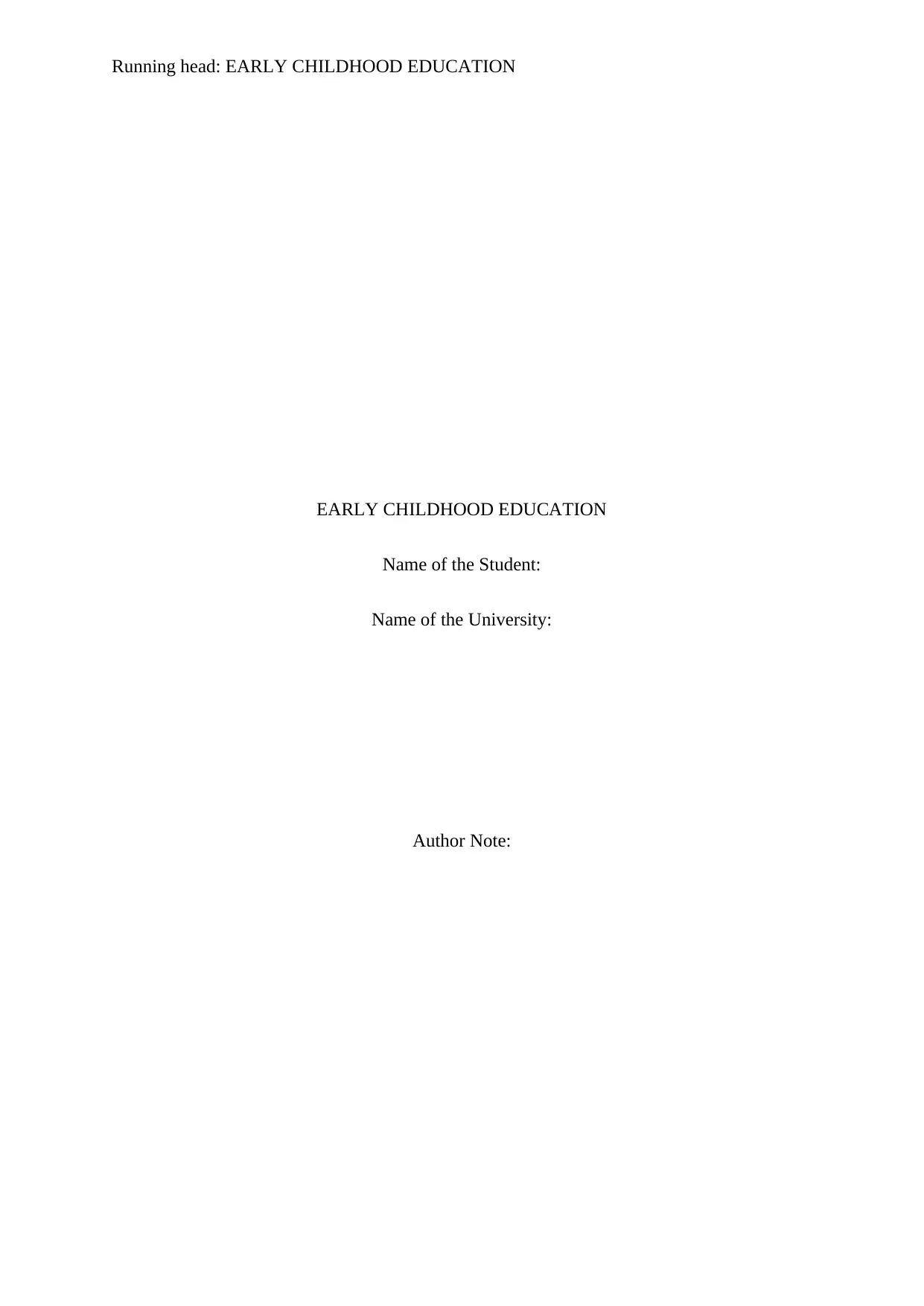
Running head: EARLY CHILDHOOD EDUCATION
EARLY CHILDHOOD EDUCATION
Name of the Student:
Name of the University:
Author Note:
EARLY CHILDHOOD EDUCATION
Name of the Student:
Name of the University:
Author Note:
Paraphrase This Document
Need a fresh take? Get an instant paraphrase of this document with our AI Paraphraser
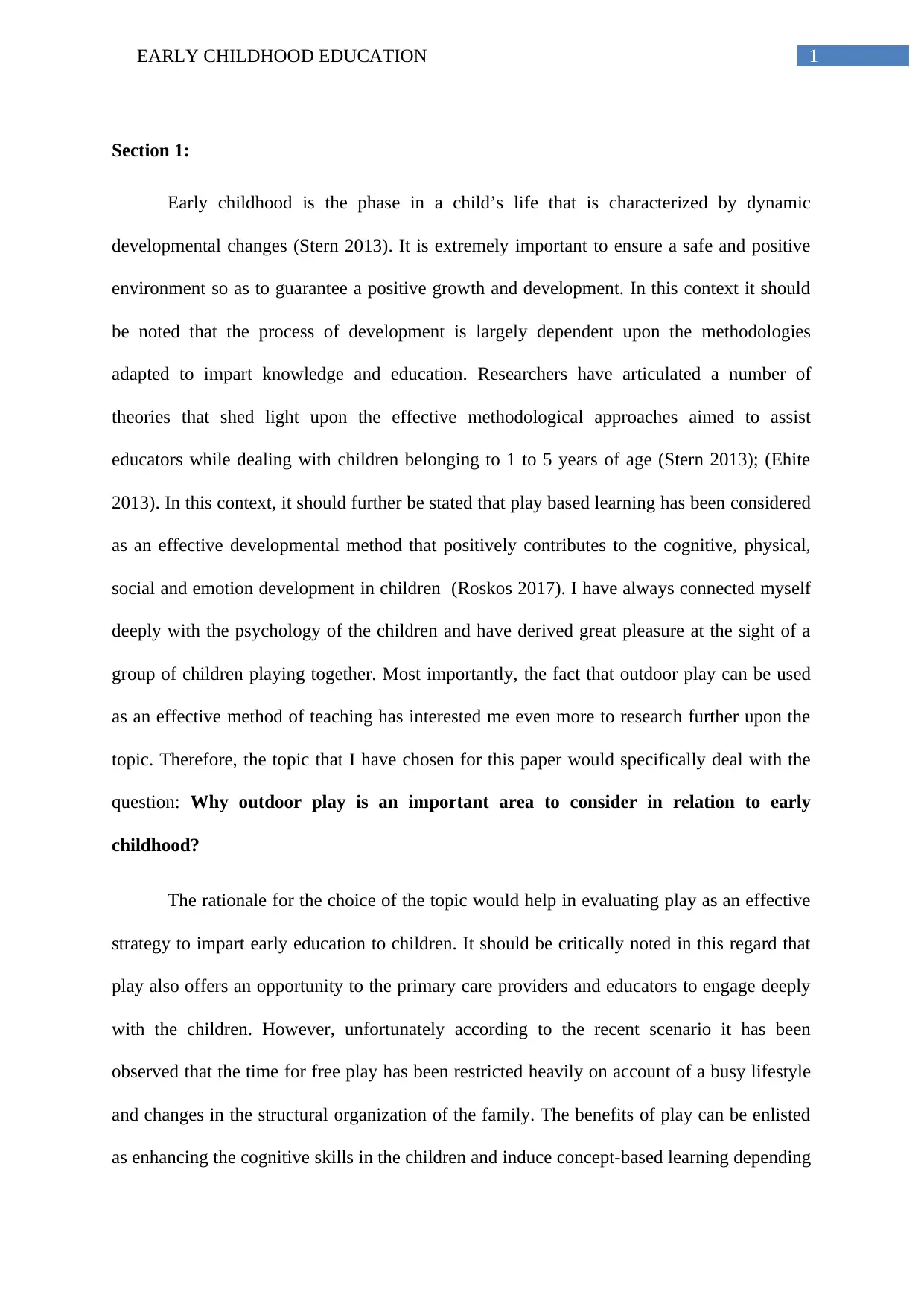
1EARLY CHILDHOOD EDUCATION
Section 1:
Early childhood is the phase in a child’s life that is characterized by dynamic
developmental changes (Stern 2013). It is extremely important to ensure a safe and positive
environment so as to guarantee a positive growth and development. In this context it should
be noted that the process of development is largely dependent upon the methodologies
adapted to impart knowledge and education. Researchers have articulated a number of
theories that shed light upon the effective methodological approaches aimed to assist
educators while dealing with children belonging to 1 to 5 years of age (Stern 2013); (Ehite
2013). In this context, it should further be stated that play based learning has been considered
as an effective developmental method that positively contributes to the cognitive, physical,
social and emotion development in children (Roskos 2017). I have always connected myself
deeply with the psychology of the children and have derived great pleasure at the sight of a
group of children playing together. Most importantly, the fact that outdoor play can be used
as an effective method of teaching has interested me even more to research further upon the
topic. Therefore, the topic that I have chosen for this paper would specifically deal with the
question: Why outdoor play is an important area to consider in relation to early
childhood?
The rationale for the choice of the topic would help in evaluating play as an effective
strategy to impart early education to children. It should be critically noted in this regard that
play also offers an opportunity to the primary care providers and educators to engage deeply
with the children. However, unfortunately according to the recent scenario it has been
observed that the time for free play has been restricted heavily on account of a busy lifestyle
and changes in the structural organization of the family. The benefits of play can be enlisted
as enhancing the cognitive skills in the children and induce concept-based learning depending
Section 1:
Early childhood is the phase in a child’s life that is characterized by dynamic
developmental changes (Stern 2013). It is extremely important to ensure a safe and positive
environment so as to guarantee a positive growth and development. In this context it should
be noted that the process of development is largely dependent upon the methodologies
adapted to impart knowledge and education. Researchers have articulated a number of
theories that shed light upon the effective methodological approaches aimed to assist
educators while dealing with children belonging to 1 to 5 years of age (Stern 2013); (Ehite
2013). In this context, it should further be stated that play based learning has been considered
as an effective developmental method that positively contributes to the cognitive, physical,
social and emotion development in children (Roskos 2017). I have always connected myself
deeply with the psychology of the children and have derived great pleasure at the sight of a
group of children playing together. Most importantly, the fact that outdoor play can be used
as an effective method of teaching has interested me even more to research further upon the
topic. Therefore, the topic that I have chosen for this paper would specifically deal with the
question: Why outdoor play is an important area to consider in relation to early
childhood?
The rationale for the choice of the topic would help in evaluating play as an effective
strategy to impart early education to children. It should be critically noted in this regard that
play also offers an opportunity to the primary care providers and educators to engage deeply
with the children. However, unfortunately according to the recent scenario it has been
observed that the time for free play has been restricted heavily on account of a busy lifestyle
and changes in the structural organization of the family. The benefits of play can be enlisted
as enhancing the cognitive skills in the children and induce concept-based learning depending
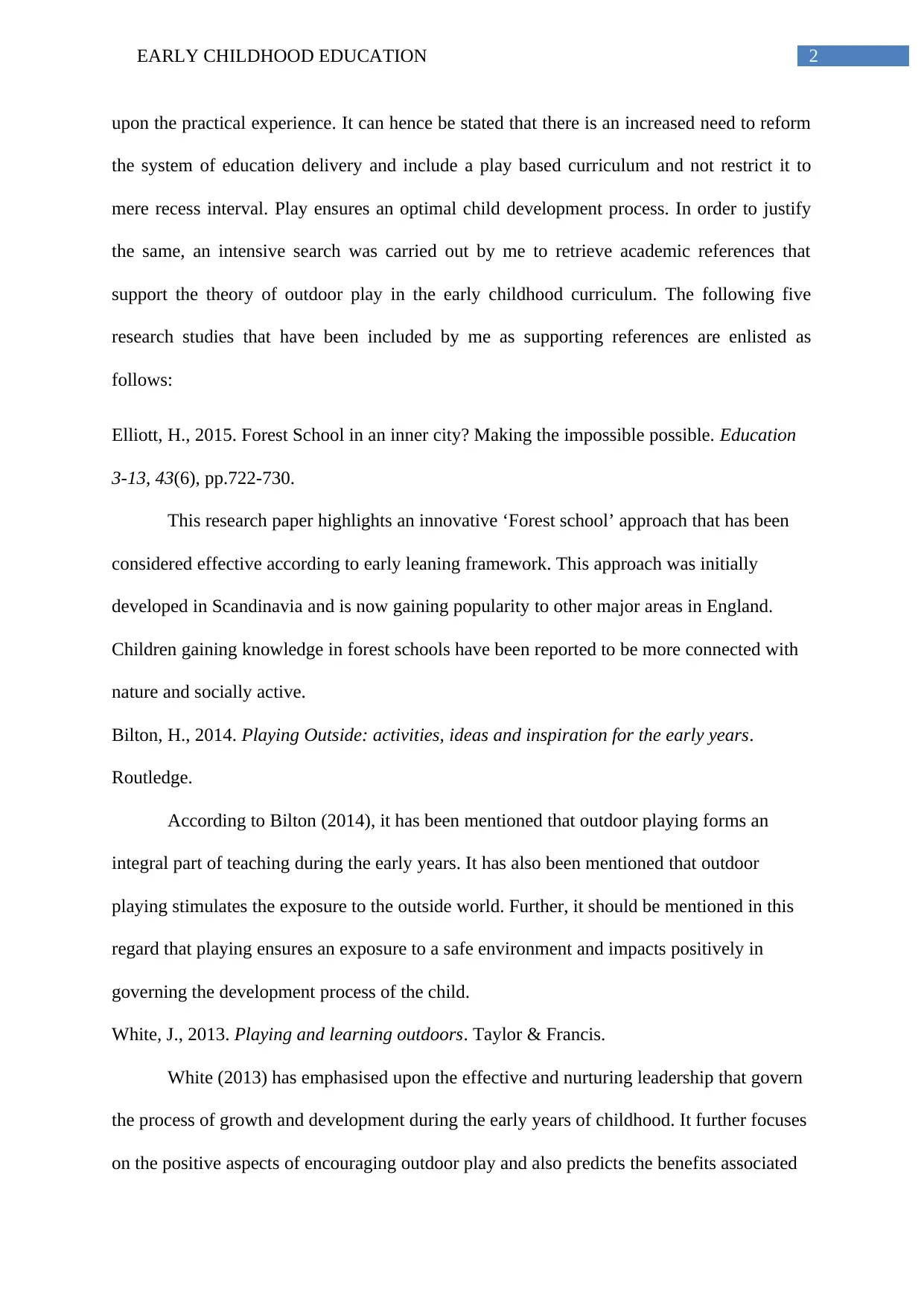
2EARLY CHILDHOOD EDUCATION
upon the practical experience. It can hence be stated that there is an increased need to reform
the system of education delivery and include a play based curriculum and not restrict it to
mere recess interval. Play ensures an optimal child development process. In order to justify
the same, an intensive search was carried out by me to retrieve academic references that
support the theory of outdoor play in the early childhood curriculum. The following five
research studies that have been included by me as supporting references are enlisted as
follows:
Elliott, H., 2015. Forest School in an inner city? Making the impossible possible. Education
3-13, 43(6), pp.722-730.
This research paper highlights an innovative ‘Forest school’ approach that has been
considered effective according to early leaning framework. This approach was initially
developed in Scandinavia and is now gaining popularity to other major areas in England.
Children gaining knowledge in forest schools have been reported to be more connected with
nature and socially active.
Bilton, H., 2014. Playing Outside: activities, ideas and inspiration for the early years.
Routledge.
According to Bilton (2014), it has been mentioned that outdoor playing forms an
integral part of teaching during the early years. It has also been mentioned that outdoor
playing stimulates the exposure to the outside world. Further, it should be mentioned in this
regard that playing ensures an exposure to a safe environment and impacts positively in
governing the development process of the child.
White, J., 2013. Playing and learning outdoors. Taylor & Francis.
White (2013) has emphasised upon the effective and nurturing leadership that govern
the process of growth and development during the early years of childhood. It further focuses
on the positive aspects of encouraging outdoor play and also predicts the benefits associated
upon the practical experience. It can hence be stated that there is an increased need to reform
the system of education delivery and include a play based curriculum and not restrict it to
mere recess interval. Play ensures an optimal child development process. In order to justify
the same, an intensive search was carried out by me to retrieve academic references that
support the theory of outdoor play in the early childhood curriculum. The following five
research studies that have been included by me as supporting references are enlisted as
follows:
Elliott, H., 2015. Forest School in an inner city? Making the impossible possible. Education
3-13, 43(6), pp.722-730.
This research paper highlights an innovative ‘Forest school’ approach that has been
considered effective according to early leaning framework. This approach was initially
developed in Scandinavia and is now gaining popularity to other major areas in England.
Children gaining knowledge in forest schools have been reported to be more connected with
nature and socially active.
Bilton, H., 2014. Playing Outside: activities, ideas and inspiration for the early years.
Routledge.
According to Bilton (2014), it has been mentioned that outdoor playing forms an
integral part of teaching during the early years. It has also been mentioned that outdoor
playing stimulates the exposure to the outside world. Further, it should be mentioned in this
regard that playing ensures an exposure to a safe environment and impacts positively in
governing the development process of the child.
White, J., 2013. Playing and learning outdoors. Taylor & Francis.
White (2013) has emphasised upon the effective and nurturing leadership that govern
the process of growth and development during the early years of childhood. It further focuses
on the positive aspects of encouraging outdoor play and also predicts the benefits associated
⊘ This is a preview!⊘
Do you want full access?
Subscribe today to unlock all pages.

Trusted by 1+ million students worldwide
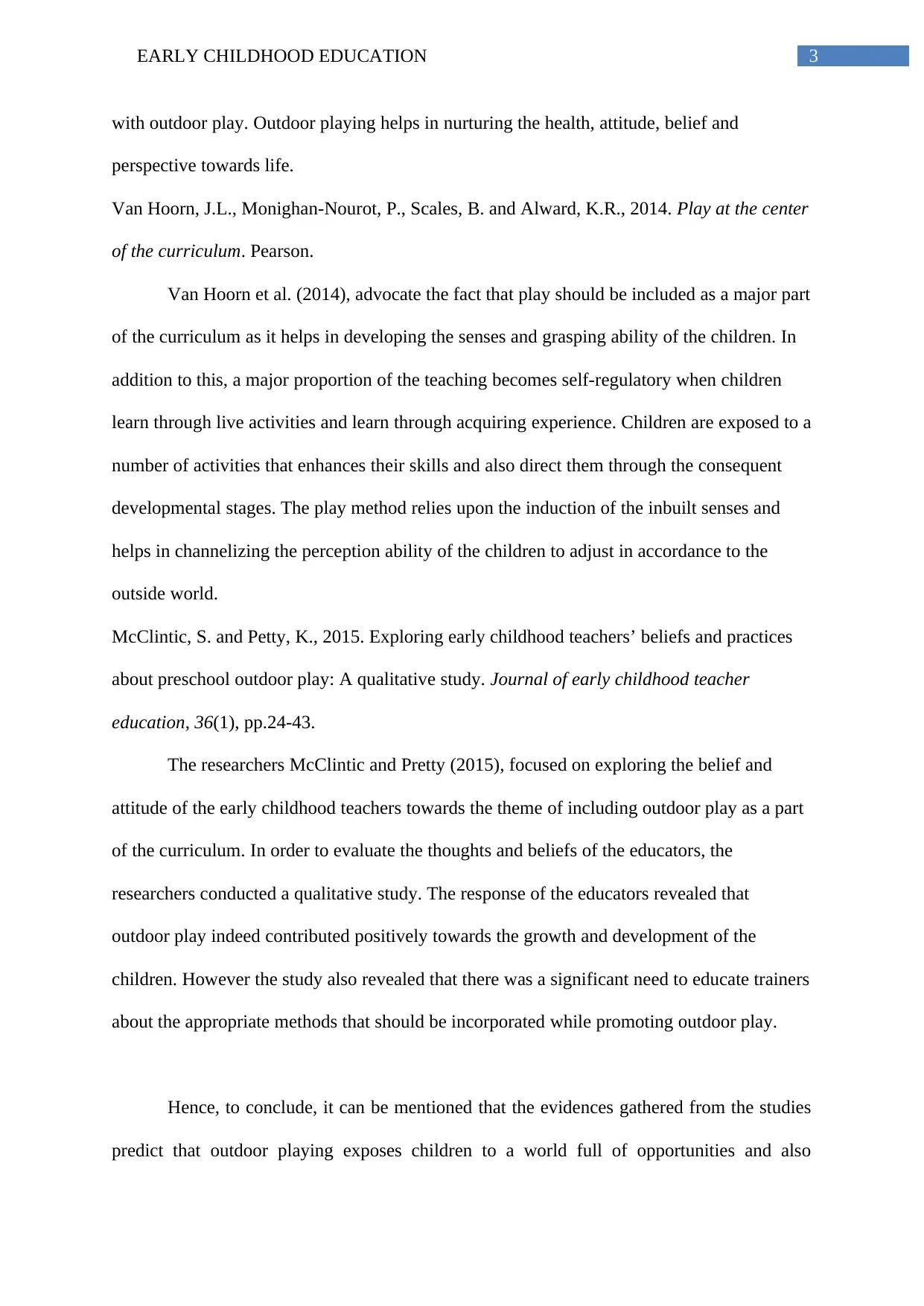
3EARLY CHILDHOOD EDUCATION
with outdoor play. Outdoor playing helps in nurturing the health, attitude, belief and
perspective towards life.
Van Hoorn, J.L., Monighan-Nourot, P., Scales, B. and Alward, K.R., 2014. Play at the center
of the curriculum. Pearson.
Van Hoorn et al. (2014), advocate the fact that play should be included as a major part
of the curriculum as it helps in developing the senses and grasping ability of the children. In
addition to this, a major proportion of the teaching becomes self-regulatory when children
learn through live activities and learn through acquiring experience. Children are exposed to a
number of activities that enhances their skills and also direct them through the consequent
developmental stages. The play method relies upon the induction of the inbuilt senses and
helps in channelizing the perception ability of the children to adjust in accordance to the
outside world.
McClintic, S. and Petty, K., 2015. Exploring early childhood teachers’ beliefs and practices
about preschool outdoor play: A qualitative study. Journal of early childhood teacher
education, 36(1), pp.24-43.
The researchers McClintic and Pretty (2015), focused on exploring the belief and
attitude of the early childhood teachers towards the theme of including outdoor play as a part
of the curriculum. In order to evaluate the thoughts and beliefs of the educators, the
researchers conducted a qualitative study. The response of the educators revealed that
outdoor play indeed contributed positively towards the growth and development of the
children. However the study also revealed that there was a significant need to educate trainers
about the appropriate methods that should be incorporated while promoting outdoor play.
Hence, to conclude, it can be mentioned that the evidences gathered from the studies
predict that outdoor playing exposes children to a world full of opportunities and also
with outdoor play. Outdoor playing helps in nurturing the health, attitude, belief and
perspective towards life.
Van Hoorn, J.L., Monighan-Nourot, P., Scales, B. and Alward, K.R., 2014. Play at the center
of the curriculum. Pearson.
Van Hoorn et al. (2014), advocate the fact that play should be included as a major part
of the curriculum as it helps in developing the senses and grasping ability of the children. In
addition to this, a major proportion of the teaching becomes self-regulatory when children
learn through live activities and learn through acquiring experience. Children are exposed to a
number of activities that enhances their skills and also direct them through the consequent
developmental stages. The play method relies upon the induction of the inbuilt senses and
helps in channelizing the perception ability of the children to adjust in accordance to the
outside world.
McClintic, S. and Petty, K., 2015. Exploring early childhood teachers’ beliefs and practices
about preschool outdoor play: A qualitative study. Journal of early childhood teacher
education, 36(1), pp.24-43.
The researchers McClintic and Pretty (2015), focused on exploring the belief and
attitude of the early childhood teachers towards the theme of including outdoor play as a part
of the curriculum. In order to evaluate the thoughts and beliefs of the educators, the
researchers conducted a qualitative study. The response of the educators revealed that
outdoor play indeed contributed positively towards the growth and development of the
children. However the study also revealed that there was a significant need to educate trainers
about the appropriate methods that should be incorporated while promoting outdoor play.
Hence, to conclude, it can be mentioned that the evidences gathered from the studies
predict that outdoor playing exposes children to a world full of opportunities and also
Paraphrase This Document
Need a fresh take? Get an instant paraphrase of this document with our AI Paraphraser

4EARLY CHILDHOOD EDUCATION
strengthens the bond shred by the children and the carers. It should also be mentioned in this
regard that playing focuses on evoking the practical essence of nature within the children and
facilitates learning through personal experience. The early learning focuses on nurturing the
natural abilities of the children within the natural environment without stressing upon
academic criticalities.
strengthens the bond shred by the children and the carers. It should also be mentioned in this
regard that playing focuses on evoking the practical essence of nature within the children and
facilitates learning through personal experience. The early learning focuses on nurturing the
natural abilities of the children within the natural environment without stressing upon
academic criticalities.
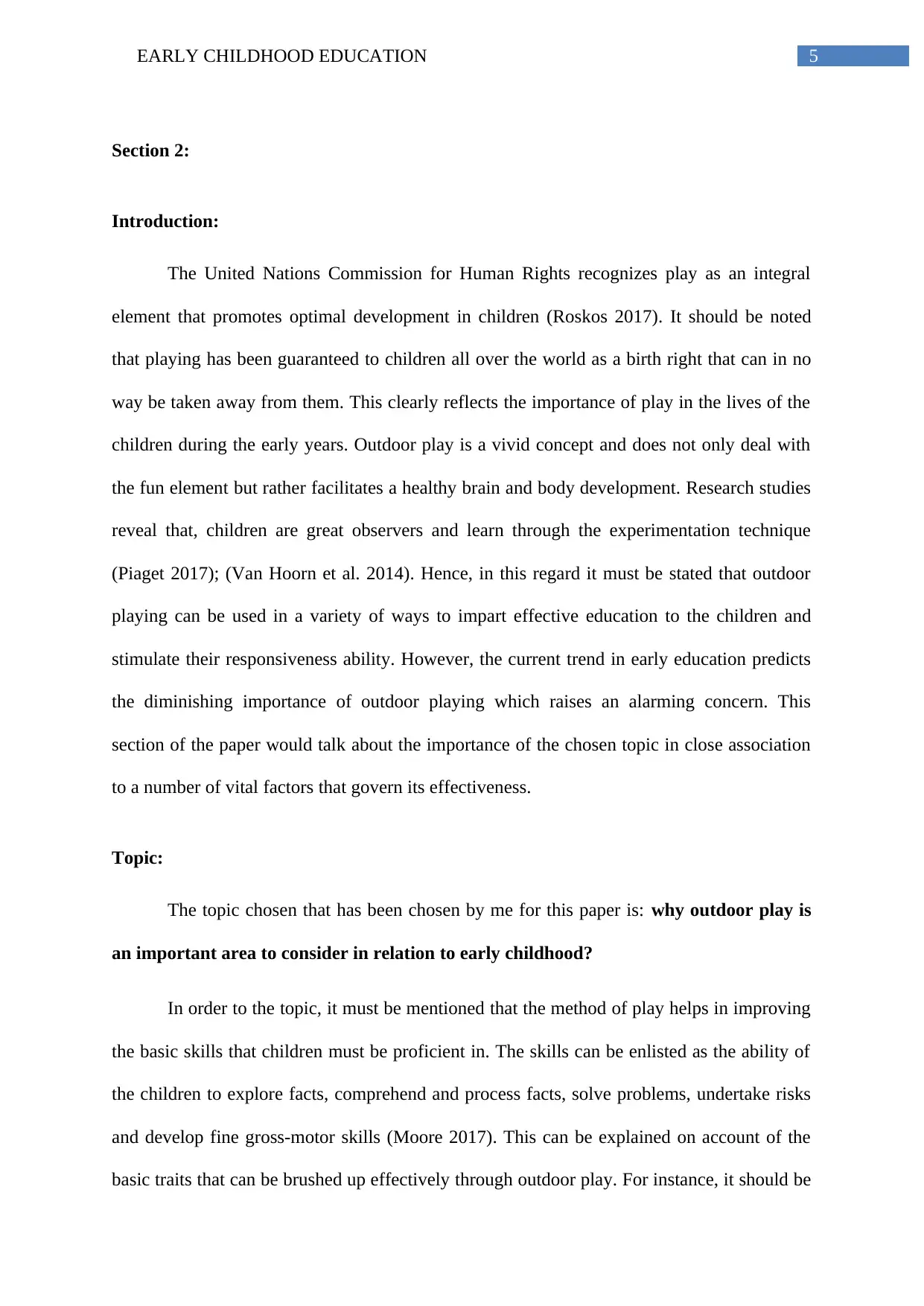
5EARLY CHILDHOOD EDUCATION
Section 2:
Introduction:
The United Nations Commission for Human Rights recognizes play as an integral
element that promotes optimal development in children (Roskos 2017). It should be noted
that playing has been guaranteed to children all over the world as a birth right that can in no
way be taken away from them. This clearly reflects the importance of play in the lives of the
children during the early years. Outdoor play is a vivid concept and does not only deal with
the fun element but rather facilitates a healthy brain and body development. Research studies
reveal that, children are great observers and learn through the experimentation technique
(Piaget 2017); (Van Hoorn et al. 2014). Hence, in this regard it must be stated that outdoor
playing can be used in a variety of ways to impart effective education to the children and
stimulate their responsiveness ability. However, the current trend in early education predicts
the diminishing importance of outdoor playing which raises an alarming concern. This
section of the paper would talk about the importance of the chosen topic in close association
to a number of vital factors that govern its effectiveness.
Topic:
The topic chosen that has been chosen by me for this paper is: why outdoor play is
an important area to consider in relation to early childhood?
In order to the topic, it must be mentioned that the method of play helps in improving
the basic skills that children must be proficient in. The skills can be enlisted as the ability of
the children to explore facts, comprehend and process facts, solve problems, undertake risks
and develop fine gross-motor skills (Moore 2017). This can be explained on account of the
basic traits that can be brushed up effectively through outdoor play. For instance, it should be
Section 2:
Introduction:
The United Nations Commission for Human Rights recognizes play as an integral
element that promotes optimal development in children (Roskos 2017). It should be noted
that playing has been guaranteed to children all over the world as a birth right that can in no
way be taken away from them. This clearly reflects the importance of play in the lives of the
children during the early years. Outdoor play is a vivid concept and does not only deal with
the fun element but rather facilitates a healthy brain and body development. Research studies
reveal that, children are great observers and learn through the experimentation technique
(Piaget 2017); (Van Hoorn et al. 2014). Hence, in this regard it must be stated that outdoor
playing can be used in a variety of ways to impart effective education to the children and
stimulate their responsiveness ability. However, the current trend in early education predicts
the diminishing importance of outdoor playing which raises an alarming concern. This
section of the paper would talk about the importance of the chosen topic in close association
to a number of vital factors that govern its effectiveness.
Topic:
The topic chosen that has been chosen by me for this paper is: why outdoor play is
an important area to consider in relation to early childhood?
In order to the topic, it must be mentioned that the method of play helps in improving
the basic skills that children must be proficient in. The skills can be enlisted as the ability of
the children to explore facts, comprehend and process facts, solve problems, undertake risks
and develop fine gross-motor skills (Moore 2017). This can be explained on account of the
basic traits that can be brushed up effectively through outdoor play. For instance, it should be
⊘ This is a preview!⊘
Do you want full access?
Subscribe today to unlock all pages.

Trusted by 1+ million students worldwide
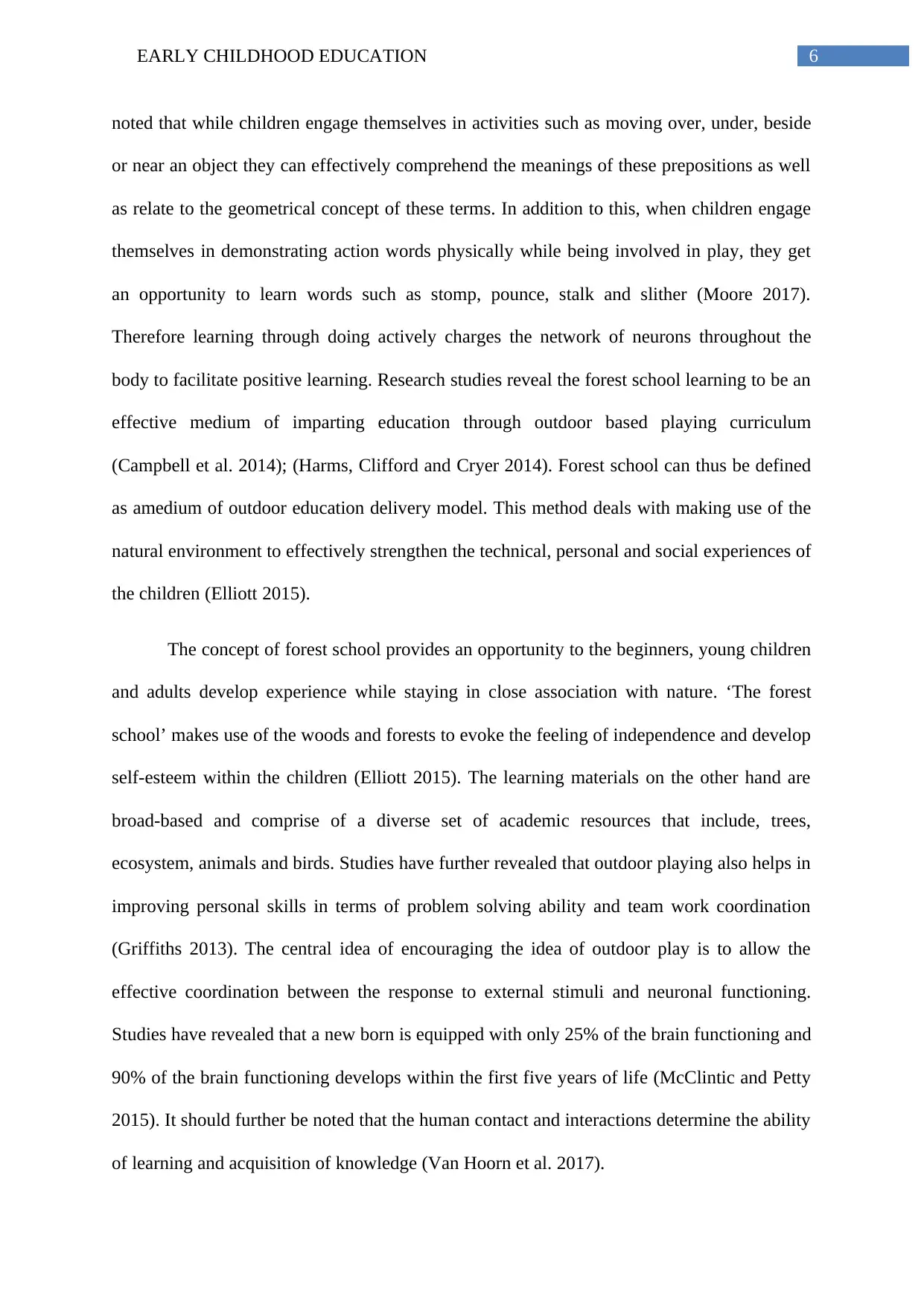
6EARLY CHILDHOOD EDUCATION
noted that while children engage themselves in activities such as moving over, under, beside
or near an object they can effectively comprehend the meanings of these prepositions as well
as relate to the geometrical concept of these terms. In addition to this, when children engage
themselves in demonstrating action words physically while being involved in play, they get
an opportunity to learn words such as stomp, pounce, stalk and slither (Moore 2017).
Therefore learning through doing actively charges the network of neurons throughout the
body to facilitate positive learning. Research studies reveal the forest school learning to be an
effective medium of imparting education through outdoor based playing curriculum
(Campbell et al. 2014); (Harms, Clifford and Cryer 2014). Forest school can thus be defined
as amedium of outdoor education delivery model. This method deals with making use of the
natural environment to effectively strengthen the technical, personal and social experiences of
the children (Elliott 2015).
The concept of forest school provides an opportunity to the beginners, young children
and adults develop experience while staying in close association with nature. ‘The forest
school’ makes use of the woods and forests to evoke the feeling of independence and develop
self-esteem within the children (Elliott 2015). The learning materials on the other hand are
broad-based and comprise of a diverse set of academic resources that include, trees,
ecosystem, animals and birds. Studies have further revealed that outdoor playing also helps in
improving personal skills in terms of problem solving ability and team work coordination
(Griffiths 2013). The central idea of encouraging the idea of outdoor play is to allow the
effective coordination between the response to external stimuli and neuronal functioning.
Studies have revealed that a new born is equipped with only 25% of the brain functioning and
90% of the brain functioning develops within the first five years of life (McClintic and Petty
2015). It should further be noted that the human contact and interactions determine the ability
of learning and acquisition of knowledge (Van Hoorn et al. 2017).
noted that while children engage themselves in activities such as moving over, under, beside
or near an object they can effectively comprehend the meanings of these prepositions as well
as relate to the geometrical concept of these terms. In addition to this, when children engage
themselves in demonstrating action words physically while being involved in play, they get
an opportunity to learn words such as stomp, pounce, stalk and slither (Moore 2017).
Therefore learning through doing actively charges the network of neurons throughout the
body to facilitate positive learning. Research studies reveal the forest school learning to be an
effective medium of imparting education through outdoor based playing curriculum
(Campbell et al. 2014); (Harms, Clifford and Cryer 2014). Forest school can thus be defined
as amedium of outdoor education delivery model. This method deals with making use of the
natural environment to effectively strengthen the technical, personal and social experiences of
the children (Elliott 2015).
The concept of forest school provides an opportunity to the beginners, young children
and adults develop experience while staying in close association with nature. ‘The forest
school’ makes use of the woods and forests to evoke the feeling of independence and develop
self-esteem within the children (Elliott 2015). The learning materials on the other hand are
broad-based and comprise of a diverse set of academic resources that include, trees,
ecosystem, animals and birds. Studies have further revealed that outdoor playing also helps in
improving personal skills in terms of problem solving ability and team work coordination
(Griffiths 2013). The central idea of encouraging the idea of outdoor play is to allow the
effective coordination between the response to external stimuli and neuronal functioning.
Studies have revealed that a new born is equipped with only 25% of the brain functioning and
90% of the brain functioning develops within the first five years of life (McClintic and Petty
2015). It should further be noted that the human contact and interactions determine the ability
of learning and acquisition of knowledge (Van Hoorn et al. 2017).
Paraphrase This Document
Need a fresh take? Get an instant paraphrase of this document with our AI Paraphraser
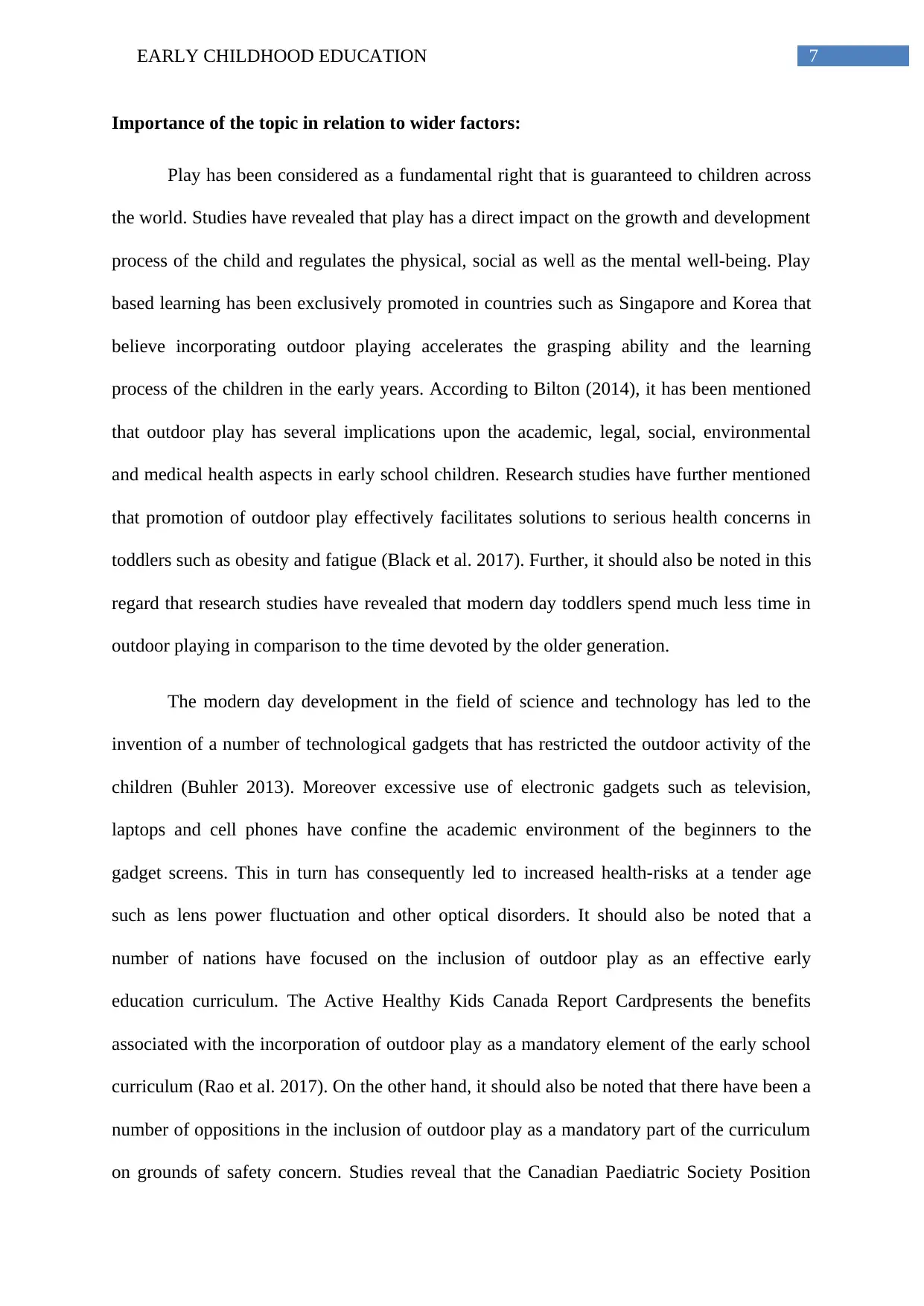
7EARLY CHILDHOOD EDUCATION
Importance of the topic in relation to wider factors:
Play has been considered as a fundamental right that is guaranteed to children across
the world. Studies have revealed that play has a direct impact on the growth and development
process of the child and regulates the physical, social as well as the mental well-being. Play
based learning has been exclusively promoted in countries such as Singapore and Korea that
believe incorporating outdoor playing accelerates the grasping ability and the learning
process of the children in the early years. According to Bilton (2014), it has been mentioned
that outdoor play has several implications upon the academic, legal, social, environmental
and medical health aspects in early school children. Research studies have further mentioned
that promotion of outdoor play effectively facilitates solutions to serious health concerns in
toddlers such as obesity and fatigue (Black et al. 2017). Further, it should also be noted in this
regard that research studies have revealed that modern day toddlers spend much less time in
outdoor playing in comparison to the time devoted by the older generation.
The modern day development in the field of science and technology has led to the
invention of a number of technological gadgets that has restricted the outdoor activity of the
children (Buhler 2013). Moreover excessive use of electronic gadgets such as television,
laptops and cell phones have confine the academic environment of the beginners to the
gadget screens. This in turn has consequently led to increased health-risks at a tender age
such as lens power fluctuation and other optical disorders. It should also be noted that a
number of nations have focused on the inclusion of outdoor play as an effective early
education curriculum. The Active Healthy Kids Canada Report Cardpresents the benefits
associated with the incorporation of outdoor play as a mandatory element of the early school
curriculum (Rao et al. 2017). On the other hand, it should also be noted that there have been a
number of oppositions in the inclusion of outdoor play as a mandatory part of the curriculum
on grounds of safety concern. Studies reveal that the Canadian Paediatric Society Position
Importance of the topic in relation to wider factors:
Play has been considered as a fundamental right that is guaranteed to children across
the world. Studies have revealed that play has a direct impact on the growth and development
process of the child and regulates the physical, social as well as the mental well-being. Play
based learning has been exclusively promoted in countries such as Singapore and Korea that
believe incorporating outdoor playing accelerates the grasping ability and the learning
process of the children in the early years. According to Bilton (2014), it has been mentioned
that outdoor play has several implications upon the academic, legal, social, environmental
and medical health aspects in early school children. Research studies have further mentioned
that promotion of outdoor play effectively facilitates solutions to serious health concerns in
toddlers such as obesity and fatigue (Black et al. 2017). Further, it should also be noted in this
regard that research studies have revealed that modern day toddlers spend much less time in
outdoor playing in comparison to the time devoted by the older generation.
The modern day development in the field of science and technology has led to the
invention of a number of technological gadgets that has restricted the outdoor activity of the
children (Buhler 2013). Moreover excessive use of electronic gadgets such as television,
laptops and cell phones have confine the academic environment of the beginners to the
gadget screens. This in turn has consequently led to increased health-risks at a tender age
such as lens power fluctuation and other optical disorders. It should also be noted that a
number of nations have focused on the inclusion of outdoor play as an effective early
education curriculum. The Active Healthy Kids Canada Report Cardpresents the benefits
associated with the incorporation of outdoor play as a mandatory element of the early school
curriculum (Rao et al. 2017). On the other hand, it should also be noted that there have been a
number of oppositions in the inclusion of outdoor play as a mandatory part of the curriculum
on grounds of safety concern. Studies reveal that the Canadian Paediatric Society Position
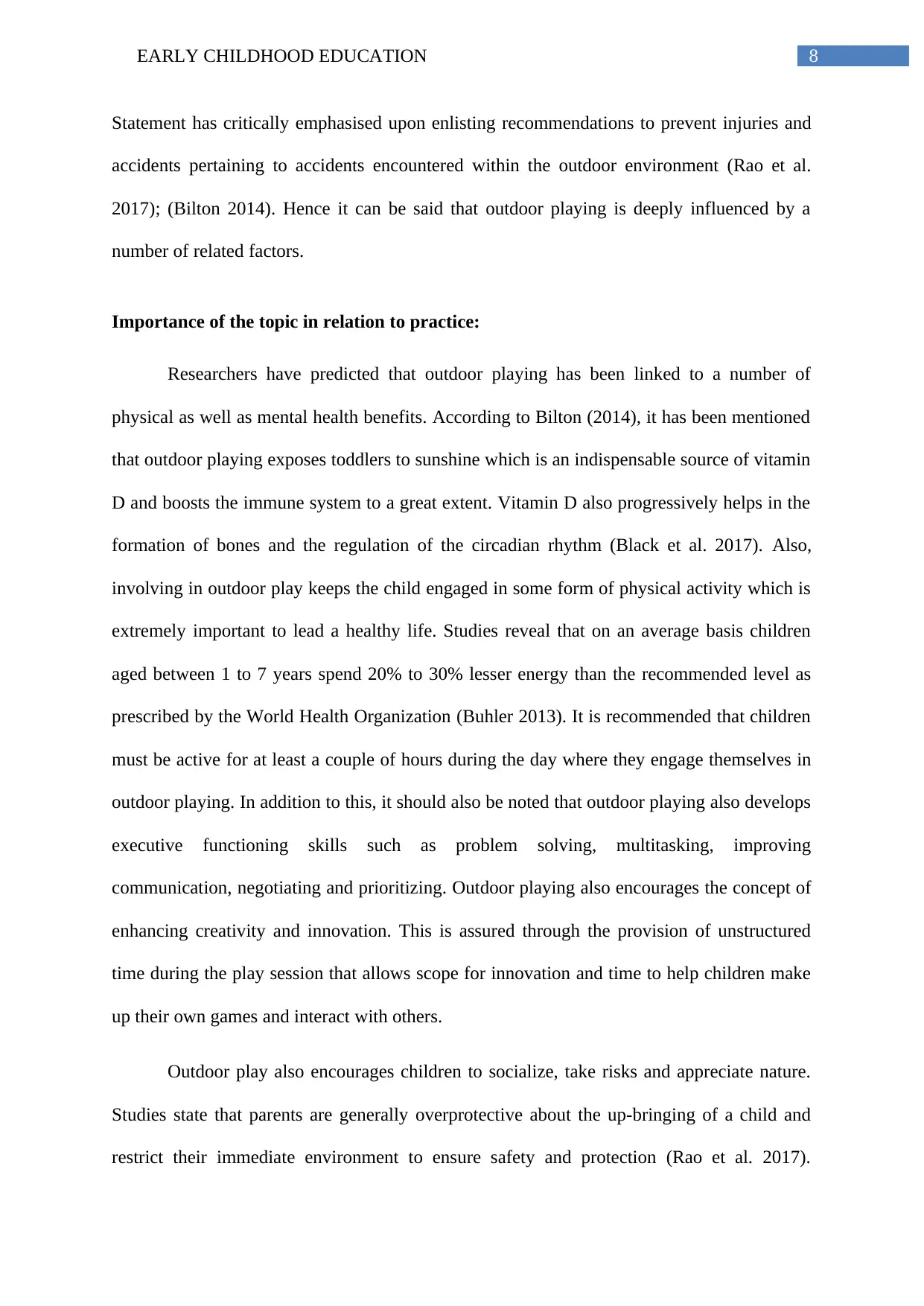
8EARLY CHILDHOOD EDUCATION
Statement has critically emphasised upon enlisting recommendations to prevent injuries and
accidents pertaining to accidents encountered within the outdoor environment (Rao et al.
2017); (Bilton 2014). Hence it can be said that outdoor playing is deeply influenced by a
number of related factors.
Importance of the topic in relation to practice:
Researchers have predicted that outdoor playing has been linked to a number of
physical as well as mental health benefits. According to Bilton (2014), it has been mentioned
that outdoor playing exposes toddlers to sunshine which is an indispensable source of vitamin
D and boosts the immune system to a great extent. Vitamin D also progressively helps in the
formation of bones and the regulation of the circadian rhythm (Black et al. 2017). Also,
involving in outdoor play keeps the child engaged in some form of physical activity which is
extremely important to lead a healthy life. Studies reveal that on an average basis children
aged between 1 to 7 years spend 20% to 30% lesser energy than the recommended level as
prescribed by the World Health Organization (Buhler 2013). It is recommended that children
must be active for at least a couple of hours during the day where they engage themselves in
outdoor playing. In addition to this, it should also be noted that outdoor playing also develops
executive functioning skills such as problem solving, multitasking, improving
communication, negotiating and prioritizing. Outdoor playing also encourages the concept of
enhancing creativity and innovation. This is assured through the provision of unstructured
time during the play session that allows scope for innovation and time to help children make
up their own games and interact with others.
Outdoor play also encourages children to socialize, take risks and appreciate nature.
Studies state that parents are generally overprotective about the up-bringing of a child and
restrict their immediate environment to ensure safety and protection (Rao et al. 2017).
Statement has critically emphasised upon enlisting recommendations to prevent injuries and
accidents pertaining to accidents encountered within the outdoor environment (Rao et al.
2017); (Bilton 2014). Hence it can be said that outdoor playing is deeply influenced by a
number of related factors.
Importance of the topic in relation to practice:
Researchers have predicted that outdoor playing has been linked to a number of
physical as well as mental health benefits. According to Bilton (2014), it has been mentioned
that outdoor playing exposes toddlers to sunshine which is an indispensable source of vitamin
D and boosts the immune system to a great extent. Vitamin D also progressively helps in the
formation of bones and the regulation of the circadian rhythm (Black et al. 2017). Also,
involving in outdoor play keeps the child engaged in some form of physical activity which is
extremely important to lead a healthy life. Studies reveal that on an average basis children
aged between 1 to 7 years spend 20% to 30% lesser energy than the recommended level as
prescribed by the World Health Organization (Buhler 2013). It is recommended that children
must be active for at least a couple of hours during the day where they engage themselves in
outdoor playing. In addition to this, it should also be noted that outdoor playing also develops
executive functioning skills such as problem solving, multitasking, improving
communication, negotiating and prioritizing. Outdoor playing also encourages the concept of
enhancing creativity and innovation. This is assured through the provision of unstructured
time during the play session that allows scope for innovation and time to help children make
up their own games and interact with others.
Outdoor play also encourages children to socialize, take risks and appreciate nature.
Studies state that parents are generally overprotective about the up-bringing of a child and
restrict their immediate environment to ensure safety and protection (Rao et al. 2017).
⊘ This is a preview!⊘
Do you want full access?
Subscribe today to unlock all pages.

Trusted by 1+ million students worldwide
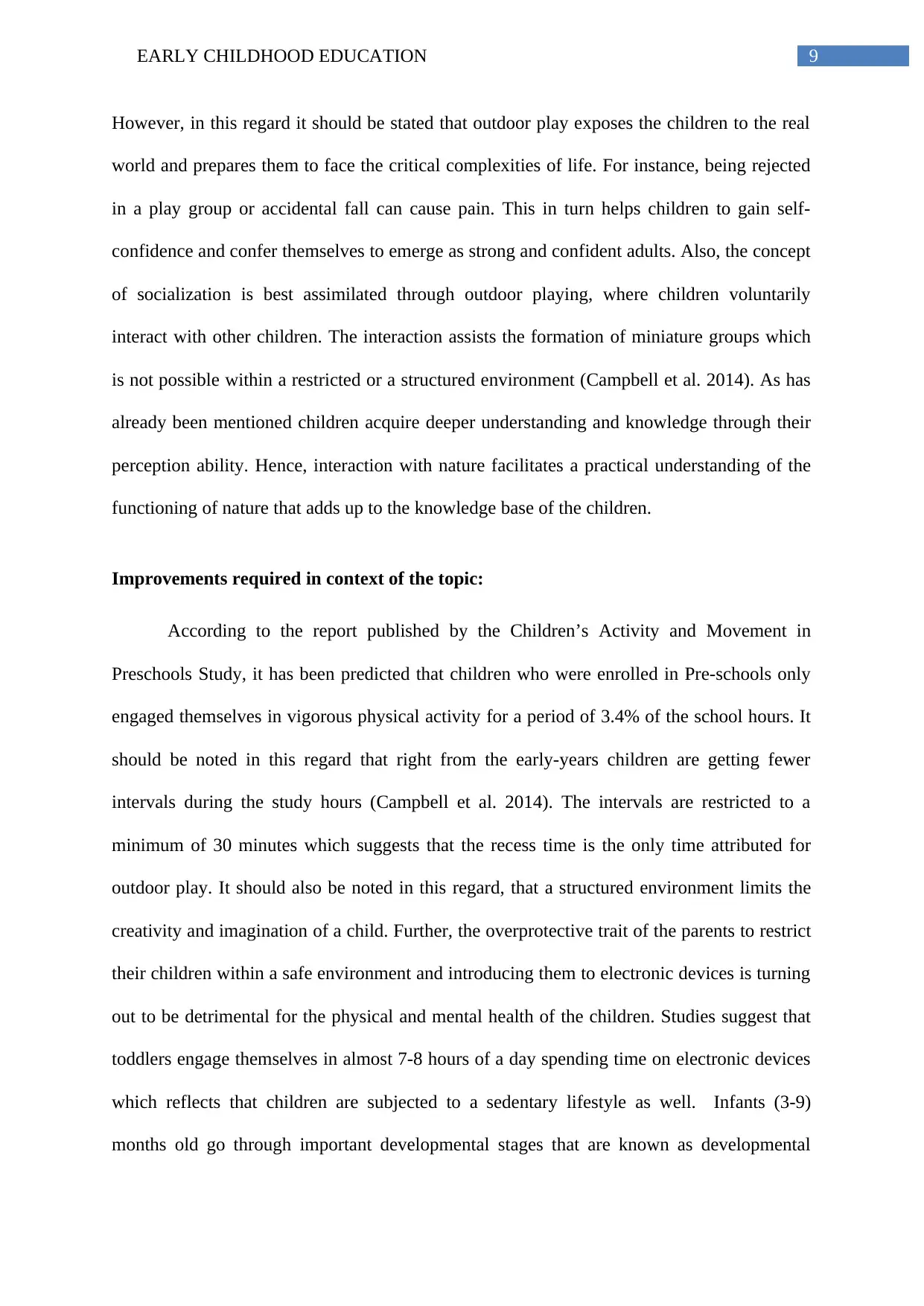
9EARLY CHILDHOOD EDUCATION
However, in this regard it should be stated that outdoor play exposes the children to the real
world and prepares them to face the critical complexities of life. For instance, being rejected
in a play group or accidental fall can cause pain. This in turn helps children to gain self-
confidence and confer themselves to emerge as strong and confident adults. Also, the concept
of socialization is best assimilated through outdoor playing, where children voluntarily
interact with other children. The interaction assists the formation of miniature groups which
is not possible within a restricted or a structured environment (Campbell et al. 2014). As has
already been mentioned children acquire deeper understanding and knowledge through their
perception ability. Hence, interaction with nature facilitates a practical understanding of the
functioning of nature that adds up to the knowledge base of the children.
Improvements required in context of the topic:
According to the report published by the Children’s Activity and Movement in
Preschools Study, it has been predicted that children who were enrolled in Pre-schools only
engaged themselves in vigorous physical activity for a period of 3.4% of the school hours. It
should be noted in this regard that right from the early-years children are getting fewer
intervals during the study hours (Campbell et al. 2014). The intervals are restricted to a
minimum of 30 minutes which suggests that the recess time is the only time attributed for
outdoor play. It should also be noted in this regard, that a structured environment limits the
creativity and imagination of a child. Further, the overprotective trait of the parents to restrict
their children within a safe environment and introducing them to electronic devices is turning
out to be detrimental for the physical and mental health of the children. Studies suggest that
toddlers engage themselves in almost 7-8 hours of a day spending time on electronic devices
which reflects that children are subjected to a sedentary lifestyle as well. Infants (3-9)
months old go through important developmental stages that are known as developmental
However, in this regard it should be stated that outdoor play exposes the children to the real
world and prepares them to face the critical complexities of life. For instance, being rejected
in a play group or accidental fall can cause pain. This in turn helps children to gain self-
confidence and confer themselves to emerge as strong and confident adults. Also, the concept
of socialization is best assimilated through outdoor playing, where children voluntarily
interact with other children. The interaction assists the formation of miniature groups which
is not possible within a restricted or a structured environment (Campbell et al. 2014). As has
already been mentioned children acquire deeper understanding and knowledge through their
perception ability. Hence, interaction with nature facilitates a practical understanding of the
functioning of nature that adds up to the knowledge base of the children.
Improvements required in context of the topic:
According to the report published by the Children’s Activity and Movement in
Preschools Study, it has been predicted that children who were enrolled in Pre-schools only
engaged themselves in vigorous physical activity for a period of 3.4% of the school hours. It
should be noted in this regard that right from the early-years children are getting fewer
intervals during the study hours (Campbell et al. 2014). The intervals are restricted to a
minimum of 30 minutes which suggests that the recess time is the only time attributed for
outdoor play. It should also be noted in this regard, that a structured environment limits the
creativity and imagination of a child. Further, the overprotective trait of the parents to restrict
their children within a safe environment and introducing them to electronic devices is turning
out to be detrimental for the physical and mental health of the children. Studies suggest that
toddlers engage themselves in almost 7-8 hours of a day spending time on electronic devices
which reflects that children are subjected to a sedentary lifestyle as well. Infants (3-9)
months old go through important developmental stages that are known as developmental
Paraphrase This Document
Need a fresh take? Get an instant paraphrase of this document with our AI Paraphraser
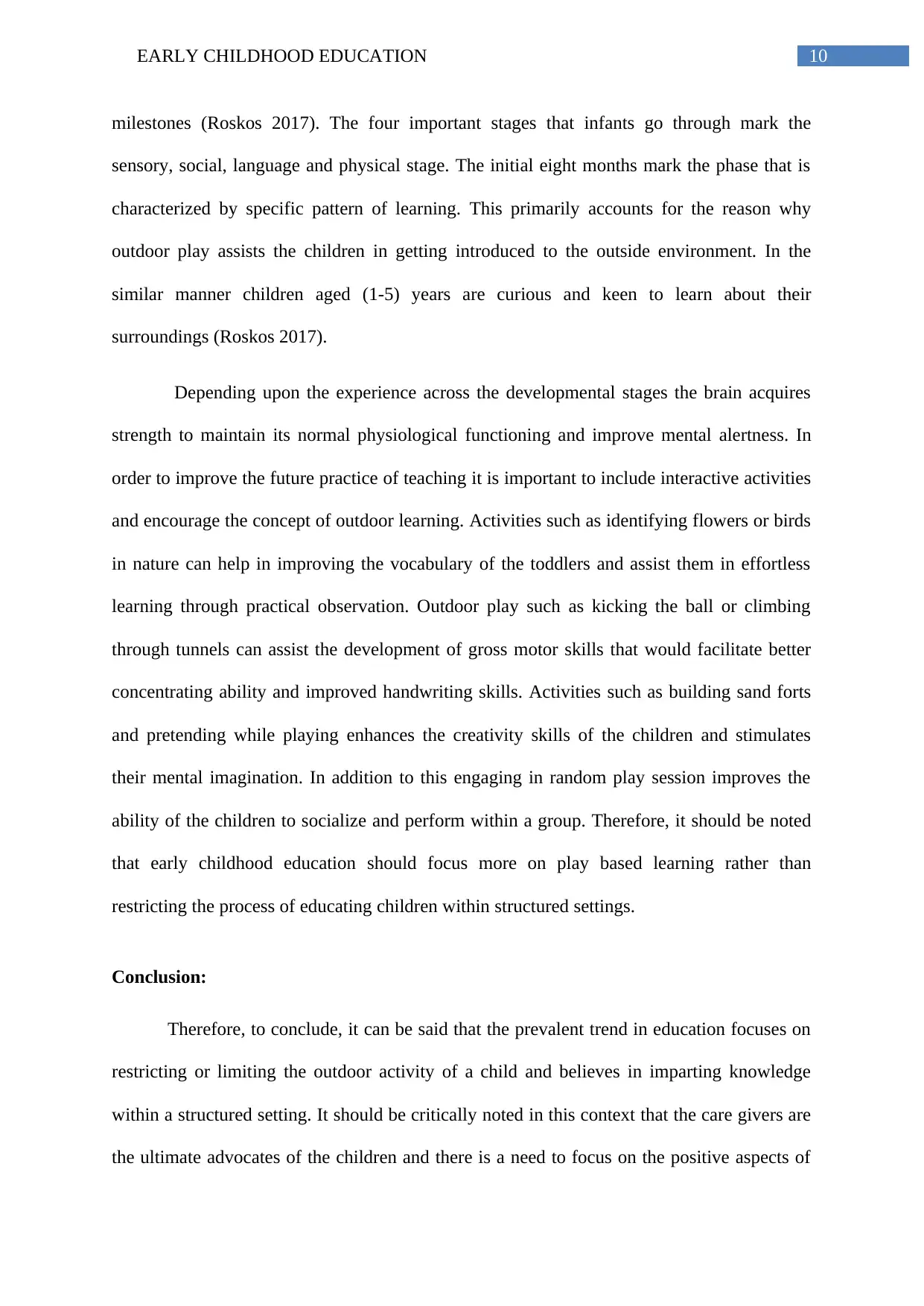
10EARLY CHILDHOOD EDUCATION
milestones (Roskos 2017). The four important stages that infants go through mark the
sensory, social, language and physical stage. The initial eight months mark the phase that is
characterized by specific pattern of learning. This primarily accounts for the reason why
outdoor play assists the children in getting introduced to the outside environment. In the
similar manner children aged (1-5) years are curious and keen to learn about their
surroundings (Roskos 2017).
Depending upon the experience across the developmental stages the brain acquires
strength to maintain its normal physiological functioning and improve mental alertness. In
order to improve the future practice of teaching it is important to include interactive activities
and encourage the concept of outdoor learning. Activities such as identifying flowers or birds
in nature can help in improving the vocabulary of the toddlers and assist them in effortless
learning through practical observation. Outdoor play such as kicking the ball or climbing
through tunnels can assist the development of gross motor skills that would facilitate better
concentrating ability and improved handwriting skills. Activities such as building sand forts
and pretending while playing enhances the creativity skills of the children and stimulates
their mental imagination. In addition to this engaging in random play session improves the
ability of the children to socialize and perform within a group. Therefore, it should be noted
that early childhood education should focus more on play based learning rather than
restricting the process of educating children within structured settings.
Conclusion:
Therefore, to conclude, it can be said that the prevalent trend in education focuses on
restricting or limiting the outdoor activity of a child and believes in imparting knowledge
within a structured setting. It should be critically noted in this context that the care givers are
the ultimate advocates of the children and there is a need to focus on the positive aspects of
milestones (Roskos 2017). The four important stages that infants go through mark the
sensory, social, language and physical stage. The initial eight months mark the phase that is
characterized by specific pattern of learning. This primarily accounts for the reason why
outdoor play assists the children in getting introduced to the outside environment. In the
similar manner children aged (1-5) years are curious and keen to learn about their
surroundings (Roskos 2017).
Depending upon the experience across the developmental stages the brain acquires
strength to maintain its normal physiological functioning and improve mental alertness. In
order to improve the future practice of teaching it is important to include interactive activities
and encourage the concept of outdoor learning. Activities such as identifying flowers or birds
in nature can help in improving the vocabulary of the toddlers and assist them in effortless
learning through practical observation. Outdoor play such as kicking the ball or climbing
through tunnels can assist the development of gross motor skills that would facilitate better
concentrating ability and improved handwriting skills. Activities such as building sand forts
and pretending while playing enhances the creativity skills of the children and stimulates
their mental imagination. In addition to this engaging in random play session improves the
ability of the children to socialize and perform within a group. Therefore, it should be noted
that early childhood education should focus more on play based learning rather than
restricting the process of educating children within structured settings.
Conclusion:
Therefore, to conclude, it can be said that the prevalent trend in education focuses on
restricting or limiting the outdoor activity of a child and believes in imparting knowledge
within a structured setting. It should be critically noted in this context that the care givers are
the ultimate advocates of the children and there is a need to focus on the positive aspects of

11EARLY CHILDHOOD EDUCATION
outdoor play. Outdoor play serves as an integral aspect that marks a healthy growth and
development. It helps in the development of the mind and body. Further, it also helps in
strengthening the social and cognitive skills of the children.
It should be noted in this regard that children acquire knowledge through
experimentation and exploration during the yearly years. Therefore, encouraging outdoor
play significantly helps in the process of stimulating the development of brain and other
associated gross motor functions of the neurons. It should also be mentioned in this respect
that outdoor playing exposes the children to the natural environment and strengthens the
analytical and comprehending skills of the children. Studies have also proven the efficacy of
the concept of outdoor play and its positive impact on improving the concentration ability and
memory retention capacity of the children. Also, basic education obtained through play
experience has proven to elicit long-term effect on the children. Hence, outdoor play must be
encouraged to ensure a healthy growth and development in children.
outdoor play. Outdoor play serves as an integral aspect that marks a healthy growth and
development. It helps in the development of the mind and body. Further, it also helps in
strengthening the social and cognitive skills of the children.
It should be noted in this regard that children acquire knowledge through
experimentation and exploration during the yearly years. Therefore, encouraging outdoor
play significantly helps in the process of stimulating the development of brain and other
associated gross motor functions of the neurons. It should also be mentioned in this respect
that outdoor playing exposes the children to the natural environment and strengthens the
analytical and comprehending skills of the children. Studies have also proven the efficacy of
the concept of outdoor play and its positive impact on improving the concentration ability and
memory retention capacity of the children. Also, basic education obtained through play
experience has proven to elicit long-term effect on the children. Hence, outdoor play must be
encouraged to ensure a healthy growth and development in children.
⊘ This is a preview!⊘
Do you want full access?
Subscribe today to unlock all pages.

Trusted by 1+ million students worldwide
1 out of 14
Related Documents
Your All-in-One AI-Powered Toolkit for Academic Success.
+13062052269
info@desklib.com
Available 24*7 on WhatsApp / Email
![[object Object]](/_next/static/media/star-bottom.7253800d.svg)
Unlock your academic potential
Copyright © 2020–2026 A2Z Services. All Rights Reserved. Developed and managed by ZUCOL.




